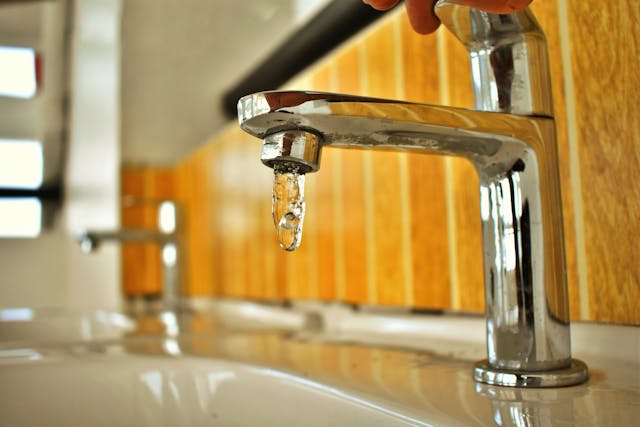How to Avoid Water Damage in Your Rental Property
Are you a landlord grappling with the potential chaos of water damage? At Redsail Property Management, we understand that water-related issues are among the most frequent—and costly—challenges property owners face.
From burst pipes to roof leaks, water can inflict serious damage on your property, compromising structures, appliances, and even tenants' personal belongings.
In severe cases, it can lead to mold growth, which not only endangers your tenants' health but also exposes you to additional legal liabilities. Preventing water damage isn’t just essential for safeguarding your investment; it’s also key to fostering strong, trusting relationships with your tenants.
Let’s explore effective strategies to help you mitigate these risks and ensure your properties remain safe and welcoming. Keep reading to learn more!
Regular Inspection and Maintenance of Plumbing
One of the most effective ways to avoid water damage is by inspecting the plumbing system regularly. Water leaks often start as minor drips, which can go unnoticed for months until they lead to significant problems.
Check for Leaks: Inspect sinks, toilets, and other water fixtures for any signs of leakage. Keep an eye out for unexplained increases in water bills, as they might signal a hidden leak.
Examine Pipe Conditions: Aging pipes are prone to cracking, rusting, and bursting, especially during colder months. Have a professional inspect the condition of your property's pipes regularly to catch potential issues before they become serious.
Install Water Leak Detectors: Installing water leak detectors in high-risk areas, such as kitchens, bathrooms, and basements, can provide an early warning if a leak begins. These devices will alert you immediately if they detect moisture, allowing you to take action before the damage worsens.

Roof Maintenance and Gutter Cleaning
Roofs and gutters are key areas where water damage often originates. A small hole in the roof or a clogged gutter can lead to significant water intrusion over time.
Inspect the Roof: Check the roof at least twice a year, preferably before and after winter. Look for damaged shingles, tiles, or areas that show wear and tear. A professional roofing contractor should handle any repairs to ensure the integrity of the roof is maintained.
Clean the Gutters: Clogged gutters can prevent water from properly draining off the roof, causing water to overflow and potentially seep into the walls and foundation. Ensure that gutters are cleaned regularly, especially after heavy rainfall or if your property is surrounded by trees.
Seal Windows, Doors, and Cracks
Water can enter your rental property through poorly sealed windows, doors, or even small cracks in the foundation. These issues are easy to overlook but can become major sources of water damage during storms or heavy rain.
Inspect and Seal Windows: Ensure that all windows are properly sealed and there are no gaps where water can seep through. Consider adding weather stripping around doors and windows to enhance protection.
Address Cracks in the Foundation: Even minor cracks can allow water to seep into your property. Check the foundation periodically for any cracks and have them sealed immediately to prevent water infiltration.
Proper Landscaping and Drainage
Landscaping plays a significant role in directing water away from your rental property. Poor drainage can lead to water pooling near the foundation, increasing the risk of water damage inside.
.jpg)
Grade the Yard Correctly: The land surrounding the property should slope away from the foundation to ensure water drains away from the building. Improper grading can lead to water collecting near the foundation, which may eventually seep inside.
Install French Drains or Sump Pumps: In areas prone to heavy rainfall, consider installing French drains or sump pumps. French drains help divert water away from the property, while sump pumps can remove excess water from basements or crawl spaces.
Prepare for Cold Weather
In colder climates, frozen pipes are a significant concern for rental properties. When water freezes in pipes, it expands and can cause the pipes to burst, leading to extensive water damage.
Insulate Pipes: Insulating exposed pipes in unheated areas such as basements, garages, and attics can prevent them from freezing during the winter. Pay special attention to outdoor hoses and faucets, as these are particularly vulnerable to freezing.
Maintain a Consistent Temperature: Ensure that the interior temperature of your rental property remains above freezing during the winter months, even when the property is vacant. Encourage tenants to keep the heat on at all times and to leave cabinet doors open to allow warm air to circulate around pipes.
Educate Your Tenants
While you can take many preventive measures as a landlord, tenants play a crucial role in helping to avoid water damage. Educate your tenants on what to look for and how to report potential issues immediately.
Inform Tenants About Water Shutoff Valves: Show your tenants where the main water shutoff valve is located and explain how to turn it off in case of an emergency. This can help minimize water damage if a leak or burst pipe occurs.
Encourage Prompt Reporting: Ask tenants to report any signs of water damage, such as damp walls, water stains, or mold growth, as soon as they notice them. The quicker you can address the issue, the less likely it is to result in costly repairs.

Work with a Professional Property Management Company
One of the best ways to prevent water damage in your rental property is by partnering with a professional property management company.
These companies offer expert oversight of maintenance and repairs, ensuring that your property is protected against potential hazards like water damage.
Regular Inspections: Property management companies can schedule and conduct regular inspections of your property, identifying potential issues early on.
Proactive Maintenance: A professional management company ensures that routine maintenance, such as plumbing checks, roof inspections, and gutter cleaning, is performed consistently and on time. This reduces the chances of undetected leaks or other water-related issues.
Quick Response to Emergencies: If water damage occurs, property management companies have the resources and contacts to respond quickly.
Tenant Communication: Property managers act as an intermediary between you and your tenants, ensuring that any water-related concerns or maintenance requests are addressed promptly. Ensuring your tenants will be happy and stay long-term.
Conclusion
Water damage can truly be a landlord's worst nightmare, but with proactive maintenance, tenant education, and the right professional support, it is entirely preventable.
By remaining vigilant and taking proactive steps, you can effectively shield your rental property from the costly and disruptive impacts of water damage.
Regular inspections, diligent roof and plumbing maintenance, and proper drainage solutions are essential strategies that not only protect your investment but also create a safe and comfortable living environment for your tenants.
For added peace of mind, consider partnering with a trusted property management company like Redsail Property Management.
With our expertise, you can rest assured that your property is in good hands, allowing you to focus on what matters most: building strong relationships with your tenants and enhancing the value of your investment.